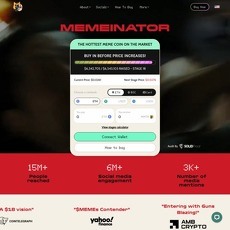Crypto AI Review
Crypto AI
cai.codes
If your website is on the scam list and you think that you are not a scammer, contact us. After you provide us with all the proof that you are in Crypto World with good intentions, we will delist you. Usually, you get in this category because you are hiding your team, you have a bad reputation(you are tricking, deceiving, scamming people), and you haven't got a written project whitepaper or is a shitty one....
Their Official site text:
Crypto AI
WHITEPAPER
($CAI)
Introduction to
Crypto AI ($CAI)
Crypto AI ($CAI), an AI-powered
NFT (non-fungible token)
generator is a software application
that uses artificial intelligence
and machine learning algorithms
to create unique digital assets
that can be sold as NFTs. NFTs
are blockchain-based tokens that
represent ownership of digital
assets, such as artwork, music,
videos, or any other type of
creative content.
The AI-powered NFT generator creates original
digital assets by analyzing existing content and
patterns in the data to generate new, unique
creations. For example, an AI-powered NFT
generator could analyze a database of images and
use machine learning algorithms to create a new
image based on the patterns and styles found in the
original data.
The advantage of using AI to create NFTs is that it
can generate an almost infinite number of unique
and original creations, making it an ideal tool for
artists and collectors looking to create or own rare
and valuable digital assets.
Moreover, the use of blockchain technology ensures
that each NFT generated by the AI-powered NFT
generator is unique and cannot be replicated,
making it a valuable and sought-after asset for
collectors and investors.
Crypto AI ($CAI) WHITEPAPER
2
How Artificial
Intelligence
Can Impact
Cryptocurrency
Artificial Intelligence (AI) can have a significant impact on the crypto industry in
several ways, including:
Trading: AI-powered trading algorithms can analyze vast amounts of market
data and make informed decisions on buying and selling cryptocurrencies.
These algorithms can identify patterns in market data, analyze news and
social media sentiment, and execute trades based on real-time data.
Fraud detection: With the increasing number of scams and fraudulent
activities in the crypto space, AI can help detect and prevent fraud. AI
algorithms can analyze transaction data to identify suspicious behavior and
flag it for further investigation.
Security: Cybersecurity is a critical issue in the crypto space. AI can help
identify and prevent cyber threats by analyzing data traffic, detecting unusual
behavior, and blocking potential threats before they can cause harm.
Portfolio management: AI-powered portfolio management tools can help
investors manage their crypto investments more effectively. These tools
can provide insights into portfolio performance, risk assessment, and asset
allocation, enabling investors to make more informed decisions.
Decentralized applications (DApps): AI can help improve the user experience
of DApps by providing personalized recommendations, optimizing user
interfaces, and automating tasks. This can help increase user adoption and
make DApps more accessible to a broader audience.
1
2
3
4
5
Crypto AI ($CAI) WHITEPAPER
3
Tokenomics
Crypto AI Utility
Deflationary token that burns a further 0.025% every transaction
100 Trillion
Supply
50%
Burn
0.05%
Tax (Reflection)
0.5%
Slippage
By providing diverse DeFi offerings,
Crypto AI intends to promptly establish
a robust presence in the DeFi market
by offering exceptional use cases. This
approach distinguishes it from other
DeFi cryptocurrency projects and
enables it to set itself apart.
Crypto AI ($CAI) WHITEPAPER
4
Crypto AI NFT
Generation
1
Crypto AI has the potential
to transform the way NFTs
are produced. Generative
art is a method of creating
unique digital art using
algorithms and code
instead of an artist. Crypto
AI uses this approach to
generate NFTs by feeding
data such as images or
videos into an AI model that
generates new artworks
based on that data.
One common technique used by Crypto AI to create
NFTs is called a generative adversarial network (GAN),
which is a type of machine learning model. The GAN
comprises a generator that creates new images based
on input data and a discriminator that evaluates the
realism of the generated images. The generator and
discriminator are trained together, with the generator
striving to produce images that the discriminator
cannot distinguish from real images. As training
progresses, the generator becomes better at creating
more realistic images.
Once Crypto AI has generated the NFT, it can be
minted on a blockchain platform such as Ethereum
or Solana, creating a unique and non-fungible digital
asset that can be bought, sold, or traded on an NFT
marketplace. This process enables the creation of an
almost infinite number of unique and valuable NFTs.
The idea of Crypto AI utilizing artificial intelligence
(AI) to create NFTs (non-fungible tokens) is a novel
concept that employs machine learning techniques
to produce exceptional digital assets. The NFTs
created via AI can be utilized to represent digital art,
collectible items, or other digital assets. These NFTs
are one-of-a-kind and cannot be duplicated, resulting
in their high value. By using AI to create NFTs, it’s
possible to generate an endless number of unique
variations, making them highly attractive to collectors.
Crypto AI ($CAI) WHITEPAPER
5
In addition, Elon Musk is also
onboard the AI bandwagon, which
would provide tailwind for Crypto AI.
Example of Crypto AI NFT Generation
One of the key advantages of using AI to generate NFTs is the ability to create extremely
intricate and unique digital assets that are extremely difficult to replicate. This offers a
greater degree of authenticity and rarity in the digital art industry. Moreover, AI-generated NFTs
can also be used to create interactive and dynamic digital art that reacts to specific conditions,
such as the time of day, weather, or other external factors. This makes them more engaging
and interactive, making them more appealing to collectors. However, it is essential to note that
creating AI-generated NFTs necessitates a comprehensive understanding of the technology, as
well as the appropriate software and infrastructure.
Most recently, Binance has ventured into an AI product called Bicasso which generates a Picassostylized NFT with AI.
Crypto AI ($CAI) WHITEPAPER
6
AI Trading Algorithm
2
One of the primary goals of
Crypto AI is to develop an
AI system that can assist
traders in generating profits
regardless of the market
conditions, whether in a bear
or bull market.
By utilizing predictive analysis, sentiment analysis,
risk management, portfolio optimization, arbitrage
opportunities, and automated trading, the AI system
can analyze market data and predict future price
movements. With pre-set rules and conditions,
automated trading can enter trades, allowing
traders to seize market opportunities more rapidly
and efficiently.
Crypto AI's unique selling point lies in its advanced
AI trading algorithm that provides consistent and
profitable results for traders, taking into account
their risk appetite, tolerance, portfolio size, and
market conditions. Cryptocurrency traders and
investors are increasingly turning to AI-powered
algorithms that analyze market data and make
trades based on that analysis. One of the significant
advantages of using AI for cryptocurrency trading
is the ability to quickly process large amounts of
data and execute trades at a faster rate than human
traders. This can lead to better performance and
higher returns.
Historical market data plays a crucial role in
training an AI trading algorithm for cryptocurrency.
By analyzing past market trends and patterns,
the algorithm can learn to predict future market
movements. This includes identifying price trends,
volume fluctuations, and news sentiment patterns.
Moreover, the algorithm can continually learn from
past results, improving its decision-making over
time.
Another essential feature of AI trading algorithms
for cryptocurrency is their ability to handle multiple
markets and coins. Some algorithms can trade
across multiple cryptocurrency exchanges and coins
simultaneously, allowing for greater diversification
and the ability to capitalize on market inefficiencies.
Additionally, some algorithms can be designed to be
adaptive to changing market conditions, adjusting
their trading strategies accordingly.
Crypto AI ($CAI) WHITEPAPER
7
Example of Crypto AI Trading AI Algorithm Platform
The image above shows that
Crypto AI has developed a
straightforward trading strategy
of entering a position based on
the green arrows and exit using
the red arrows The use of full
statistics from TradingView
enables efficient back-testing
of bots and strategies before
implementation in the real
market or using paper trading to
refine the program.
AI Trading Bots Types
There are different types of traders, such as longterm, swing, day, and scalping traders, which can be
implemented in a bot by programmers. Crypto AI has the
flexibility to include any logic in its algorithm.
Algorithmic trading can be classified based on the type
of algorithms used, such as Neural Network or Artificial
Intelligence bots, quantitative trading, semi-automatic
bots, and genetic algorithms. These types range from
simple single-perceptron bots to complex LSTM networks
and even artificial news analysis using heuristics and
keyword ranking.
However, there are also risks and limitations to using AI
trading algorithms for cryptocurrency. One of the main
risks is the potential for mistakes or failure to adapt to
new market conditions. Additionally, the algorithm's
performance depends on the accuracy and completeness
of the training data, and the constantly evolving crypto
market can make it difficult for AI to keep up with the
latest trends. Despite this, the use of AI in cryptocurrency
trading is a developing field with the potential to continue
improving over time.
Crypto AI ($CAI) WHITEPAPER
8
Decentralized
Applications (DApps)
Decentralized applications, or DApps, are a type of
software that runs on a blockchain network, and they
are typically created using programming languages like
Solidity or Vyper. While Artificial Intelligence (AI) and
machine learning have been used in various aspects of
cryptocurrency trading and investing, their application in
the development of DApps is still in its early stages.
3
Crypto AI ($CAI) WHITEPAPER
9
However, there are some potential ways in which AI could be used to develop DApps for cryptocurrency:
1. Smart Contract Generation: One possible use case for AI in DApp development is the generation of
smart contracts. Smart contracts are self-executing contracts that automate the process of executing
a transaction when certain conditions are met. By using AI algorithms to analyze market data, an AIpowered DApp could generate smart contracts that are optimized for specific market conditions.
2. Predictive Analytics: Another way in which AI could be used in DApp development is through predictive
analytics. AI algorithms could be used to analyze market data and make predictions about future market
trends, which could be used to develop DApps that are better suited for these market conditions. For
example, an AI-powered DApp could be designed to automatically adjust its functionality based on changes
in market conditions, such as increased volatility or changes in trading volume.
3. User Behavior Analysis: AI algorithms could also be used to analyze user behavior on existing DApps to
gain insights into user preferences and usage patterns. This information could then be used to develop
new DApps that are more intuitive and user-friendly, which could help to increase adoption and usage of
the platform.
4. Automated Testing: AI could also be used to automate the testing process for DApps. This would involve
using machine learning algorithms to identify potential bugs and vulnerabilities in the DApp code, which
could help to improve the security and reliability of the platform.
In summary, while the application of AI in DApp development is still in its early stages, there are several
potential use cases for this technology. By leveraging AI algorithms for smart contract generation, predictive
analytics, user behavior analysis, and automated testing, developers could create DApps that are more
efficient, secure, and user-friendly.
Example of Crypto AI DApp Analytics Interface
Crypto AI ($CAI) WHITEPAPER
10
Outside Crypto
Applications
Crypto AI ($CAI) has a wide range
of applications beyond the realm of
cryptocurrency and blockchain technology.
Here are some examples of non-crypto
utilities that can be developed in later phases:
4
Crypto AI ($CAI) WHITEPAPER
11
Illustration of
an AI-powered
Chatbot
1. Healthcare: AI can be used in medical
research, diagnosis, and treatment.
Machine learning algorithms can analyze
large amounts of medical data to identify
patterns and insights that can improve
patient outcomes. AI can also be used to
develop personalized treatment plans
based on a patient's unique characteristics.
2. Customer service: AI-powered chatbots
can provide customer service support
24/7, improving customer satisfaction
and reducing costs for businesses. Natural
Language Processing (NLP) algorithms
enable chatbots to understand and respond
to customer queries in real-time.
3. Fraud detection: AI can be used to detect
fraudulent activity across a range of
industries, including banking, insurance, and
e-commerce. Machine learning algorithms
can identify patterns and anomalies in data
that may indicate fraudulent activity.
4. Transportation: AI can be used to optimize
transportation networks and improve traffic
flow. Machine learning algorithms can analyze
real-time traffic data to predict congestion and
suggest alternative routes. Self-driving cars also
rely on AI to make decisions and navigate roads
safely.
5. Manufacturing: AI can be used to optimize
manufacturing processes and improve efficiency.
Machine learning algorithms can analyze sensor
data from production lines to identify patterns
and optimize production schedules. AI-powered
robots can also perform repetitive and dangerous
tasks, improving worker safety and productivity.
6. Education: AI can be used to personalize
education and improve student outcomes.
Machine learning algorithms can analyze student
data to identify learning gaps and suggest
personalized learning plans. AI-powered chatbots
can also provide 24/7 support to students,
answering questions and providing feedback.
These are just a few examples of the many non-crypto utilities for AI. As AI technology continues to
advance, we can expect to see more innovative applications across a wide range of industries.
Crypto AI ($CAI) WHITEPAPER
12
Roadmap Phase 3
• 100,000 $CAI Holders
• AI Trading Bot V1
• AI Dapp Analytics V1
• AI NFT Generation Bot V2
• Cross-bridge launch in
Ethereum, Polygon, Doge
• Major Cryptocurrency
Conventions and Sponsor
• CEX Listing in Binance, Huobi
Phase 2
• 50,000 $CAI Holders
• 20,000 Telegram Members
• Targeted marketing campaign to whales
• AI Trading Bot Beta
• AI DApp Analytics Beta
• CEX Listing in Gate.IO, KuCoin
• Banners and Billboards in Dubai, New York
Phase 1
• 20,000 $CAI holders
• 10,000 Telegram users
• NFT Image Generator v1
• CoinGecko & CoinMarketCap Listing
• Media release on Bloomberg, Benzinga, Digital Journal
• TrustWallet, TokenPocket Listing
• CEX Listing in Lbank, MEXC
Crypto AI ($CAI) WHITEPAPER
13













